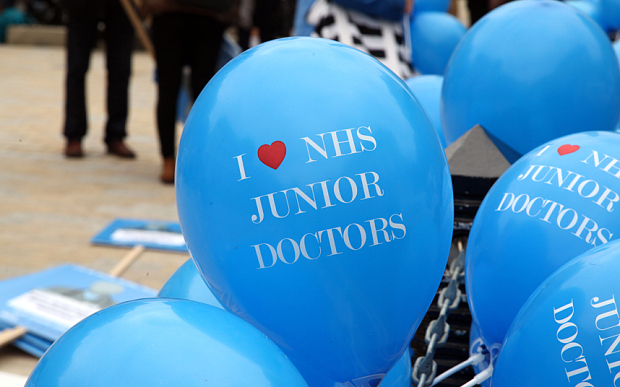In Support of Junior Doctors

As I write this, the website of the British Medical Association is utterly failing to load. I’ve sat and poked it, hit refresh, and no, it’s not coming up. And I wonder whether this is in any way connected with the announced strike for junior doctors on December 1st?
Juniors doctors are striking over new contracts that the Tory government and its ever-delightful Health Minister, Jeremy Hunt, are attempting to impose. The intention of these contracts sounds noble: a 7-day NHS, fewer working hours for doctors (who can easily, easily do upwards of 72 hours a week), and a simplified pay system. It all sounds good.
Except…
… and this is why I’m supporting the strike…
… it’s kinda bollocks.
Let’s take it a bit at a time. The 7-day NHS was a manifesto pledge, largely derived from a slightly dubious study which stated that more patients died at weekends than in weekdays. It sounds good, but in fact it doesn’t carry much meaning. Hospitals don’t close on Saturdays and Sundays; doctors are still in the wards, nurses are still carrying out critical care, A and E does not shut down. What’s not happening are tests, imaging and extra non-critical lab work. And there’s the big word – non-critical. If you are rushed to hospital with an injury on a Sunday, you will get treated. If you want to have that bunion CT scanned, you have to wait to Monday.
Moreover, this ambition of a 7-day NHS seems to be in direct contradiction with the other part of the plan – to cut the number of hours doctors are working. The NHS is already straining at the seams. Tests are taking weeks, if not months to be done, and why? Because there’s a staffing shortage. There simply aren’t enough people to get things done fast enough. So if Jeremy Hunt wants to have more doctors working on the weekend, he’s going to have to get them to work more hours, directly in contradiction to his stated pledge.
It’s also worth noting that junior doctors are not the be-all/end-all of the NHS. A 7-day service doesn’t just mean having junior doctors in the wards more. It means having ward clerks, lab technicians, radiographers, social services and all the vast support network without which it simply isn’t safe or practicable for doctors to run complicated tests or discharge patients. It means that the entire NHS is going to have to work more, and this on the back of a system that’s been told to make savings wherever it can.
In short: this isn’t so much a manifesto commitment, as a manifesto contradiction. In a system where most departments are already falling below their needed recruitment levels, this new plan seems destined to drive up the number of hours already over-worked doctors are doing, to the point where the British Medical Association is warning that it’ll become unsafe for patients. Because at the end of the day – do you want someone who’s slept 8 hours, or 4, making life-changing decisions about your health?
Then there’s pay.
It is a sad reflection on the values of society at the moment that the starting salary for a teacher or a doctor can be almost £10k less than the starting salary of a lawyer or a banker. The two most important professions in the country are already under-valued, and after 4 years of a medical degree and 5 years of constant work and training in NHS hospitals, a junior doctor’s base pay may still only be between £24-28k for their work. And no, it’s not 9-5 work, it’s often 12-14 hour days, it’s night shifts, it’s weekends, it’s constant on-your-feet work. It’s the very definition of life and death, from being the people who will resuscitate a child who’s not breathing, to the last providers of care to the dying, and it’s one of the most stressful, vital jobs in the country. It is already obscene that pay is so low, and it’s massively discouraging to anyone thinking of becoming a doctor. At the end of the day, pay does reflect the respect a person receives, and it is only right to respect doctors more.
What’s the deal then, with banding?
Banding is essentially a supplementary income that doctors earn for working anti-social hours. At the moment this includes the weekend, late evenings and night-shifts, which frankly is a large percentage of what junior doctors work. A junior doctor can supplement their base salary by doing these anti-social shifts (and doctors are generally obliged to do so) taking their salary into the £30/40ks depending on seniority. The new contract re-defines what is anti-social, essentially slashing into this anti-social pay and dragging the doctor’s salary back down. Jeremy Hunt has proposed an 11% increase to base-pay to make up for this fact, but given that doctors could lose up to 40% of their pay when banding is changed, we’re still talking about a straight-up pay cut to doctors. Who, let’s not forget, will be working fewer hours while staffing a 7-day NHS, oh yes…
So the junior doctors are going on strike. Their first proposed strike day they’re still going to cover emergency services, so it’s not so much a strike as another working weekend, in its way. The days proposed after that will be full walk-outs. There has been an outcry against this – a clamour of ‘clearly doctors only care about their pay and not about patients’ in response to this plan. But I’d say this is wrong. If doctors in the UK only cared about their pay, I very much doubt that there would be 53,000 junior doctors in this country at all. You don’t join the NHS looking to make money. More to the point, the strike is about protecting the future of the NHS. A future in which doctors aren’t making decisions on no sleep, and in which the professional who is handling your case is actually able to make safe, responsible choices.
It’s about a future in which medics don’t flee to other countries or private medicine, and by extension, a future in which the NHS can run at all, because there will only be a National Health Service when there are doctors, and there will only be doctors when they are given half the respect a banker or a lawyer gets for the work they do.
The NHS has been a political football for the last few decades. It’s not perfect, it’s straining at the seams, but it’s still the single greatest expression of Britain as a cohesive, equal society that we have, and the most humane collective institution we share. We should treat both it, and the men and women who are at its heart, with respect.





